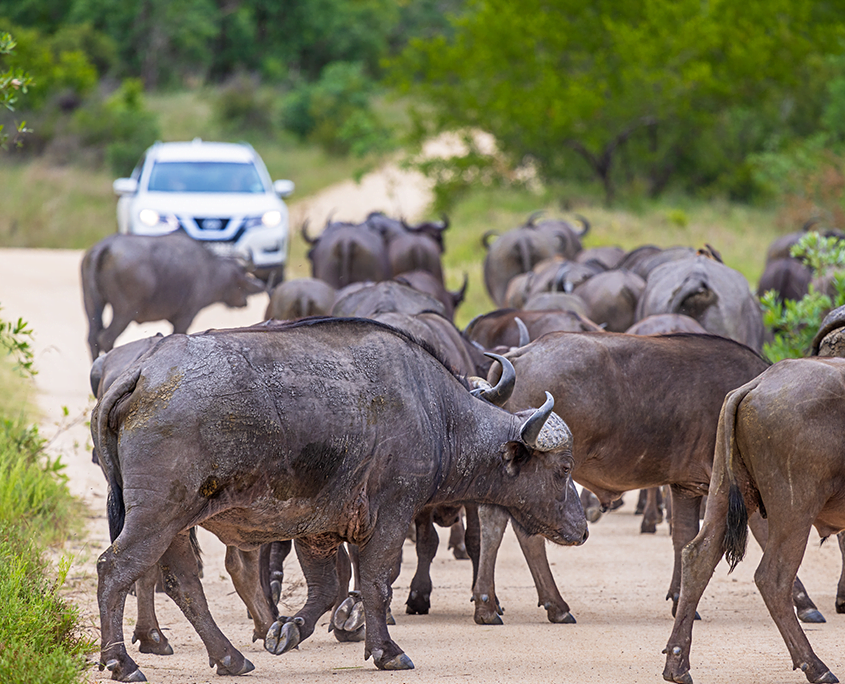Large herd of African buffaloes crossing a road in the Kruger National Park in South Africa
Photo Credit: carstenbrandt/iStock/Getty Images
International Day for Biological Diversity
This year’s celebrations of the International Day for Biological Diversity, on 22 May 2019, focus on biodiversity as the foundation for our food and health and a key catalyst to transforming food systems and improving human health.
International Day for Biological Diversity highlights the global importance of Biodiversity for all people and the planet.
Biodiversity is all nature, all forms of life on earth; from individual species to entire ecosystems. Biodiversity is also seen as the natural infrastructure supporting all life on earth- including human life.
The theme for this year’s International Day for Biological Diversity- #OurFoodOurHealthOurBiodiversity- aims to leverage knowledge and spread awareness of the dependency of our food systems, nutrition, and health on biodiversity and healthy ecosystems. The theme also celebrates the diversity provided by our natural systems for human existence and well-being on Earth, while contributing to other Sustainable Development Goals, including climate change mitigation and adaptation, ecosystems restoration, cleaner water, and zero hunger, among others.
Biological diversity is fundamental to agriculture and food production
People rely on a variety of food, shelter, and goods for their livelihood. Yet, humans put increasing pressure on species and their environments. As a result, many plants and animals are at risk, as well as essential natural processes such as pollination by insects and the regeneration of soils by microorganisms.
To feed a growing population, agriculture must provide more food. It will also be very essential to increase its resilience by protecting a wide array of life forms with unique traits, such as plants that survive drought or livestock that reproduce in harsh conditions. Sustainable agricultural practices can both feed people and protect the oceans, forests, prairies, and other ecosystems that harbour biological diversity. A rich variety of cultivated plants and domesticated animals are the foundation for agricultural biodiversity. Yet people depend on just 14 mammal and bird species for 90 percent of their food supply from animals. And just four species – wheat, maize, rice, and potato – provide half of our energy from plants.
Apart from the absolute number of species, it is also essential to conserve genetic diversity within each species. Modern agriculture has encouraged many farmers to adopt uniform high-yielding types of plants or animals. But when food producers abandon diversity, varieties, and breeds may die out – along with specialized traits. Having a broad range of unique characteristics allows plants and animals to be bred to meet changing conditions while giving scientists the raw materials they need to develop more productive and resilient crop varieties and breeds.
We must understand that biodiversity is interlinked with poverty alleviation and food security. Without biodiversity, there is no sustainable development, poverty alleviation, and food security, and without sustainable development, we cannot possibly hope to conserve or sustainably use our natural resources.
In the developing world, more than 1.2 billion people currently live below the international poverty line. Among the poor, many have problems obtaining adequate, nutritious food for themselves and their families. It is alarming to note that hunger and malnutrition claim 10 million lives every year, one life every 5 seconds. Six million children under 5 die every year from hunger. (Food and Agriculture Organisation of the United Nation, 2004).
Biodiversity proves to be the foundation of health
By securing the life-sustaining goods and services that biodiversity provides to us, the conservation and sustainable use of biodiversity can provide significant benefits to our health.
In contrast, the continuing loss of biodiversity on a global scale represents a direct threat to our health and well-being. Without a global environment that is healthy and capable of supporting a diversity of life, no human population can exist.
Biodiversity is also important in that:
Diets based on a diversity of food species promote health and can help to protect against diseases by addressing the problem of micronutrients and vitamin deficiencies.
Studies of wildlife anatomy, physiology, and biochemistry can lead to important developments in human medicine. Biodiversity loss and ecosystem change can increase the risk of the emergence or spread of infectious diseases in animals, plants, and humans. As we celebrate our planet’s tremendous wealth of biodiversity, there needs to be a commitment from everyone to also keep the promise of eliminating world hunger.



